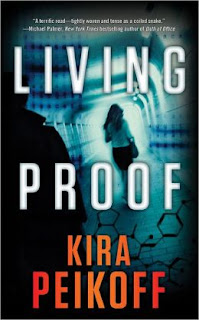 Washington, D.C., reporting on business and technology for Newsday, and researching feature stories for New York magazine.
Washington, D.C., reporting on business and technology for Newsday, and researching feature stories for New York magazine.Realizing that fiction was her true love, she dedicated herself full-time to writing Living Proof, her debut novel. The story was inspired by her experience reporting from the White House in the summer of 2006, as she watched President Bush announce the first veto of his presidency to deny federal funding for embryonic stem cell research. Peikoff’s passionate feelings about what many people view as a controversy of morality vs. science–one with potentially life-or-death stakes–led to the central conflict in Living Proof.
She applied the Page 69 Test to Living Proof and reported the following:
This page is key to the plot. The story takes place in a near-future world in which the destruction of an embryo is first-degree murder. The heroine is a young fertility doctor named Arianna Drake with a dangerous secret and a notorious past as a supporter of an infamous stem cell scientist. When Arianna’s clinic grows inexplicably popular, she attracts the suspicion of the Department of Embryo Preservation, an oversight agency whose mission is to monitor and record the creation of every embryo outside the womb. The Department can find no obvious reason for the sudden spike in popularity of Arianna’s small clinic, so it sends an undercover agent named Trent Rowe to investigate her for possible illegal activities.Learn more about the book and author at Kira Peikoff's website.
Trent’s challenge is to find a way to introduce himself to her in a neutral venue, then worm his way into her life. Through her social networking profile, he discovers her love of a certain mystery writer who is appearing in her neighborhood for a book signing that week. Trent manages to make sure she knows about the event, which he also attends. On p. 69, he makes his crucial—yet relaxed, charming—introduction by posing as a fellow fan; it’s an introduction on which his entire mission depends, since he knows he’ll never have another shot at a first impression. Does it go horribly or perfectly according to plan? You’ll have to read to find out!
--Marshal Zeringue

























